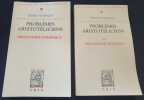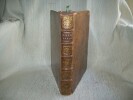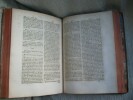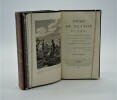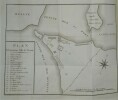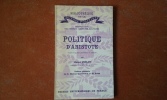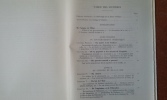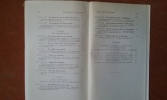-
Type
Book (1176)
Magazine (4)
-
Latest
Last 24h (1)
Last 3 days (25)
Last month (37)
-
Language
English (2)
French (1174)
Greek (2)
Latin (1)
Russian (1)
-
Century
16th (11)
17th (7)
18th (10)
19th (66)
20th (600)
21st (78)
-
Countries
Belgium (428)
Canada (11)
Côte d'Ivoire (1)
Denmark (7)
France (522)
Germany (2)
Greece (3)
Netherlands (153)
Switzerland (52)
United States of America (1)
-
Syndicate
ALAC (11)
CLAM (2)
CNE (1)
ILAB (246)
NVVA (4)
SLACES (4)
SLAM (217)
La politique livre I.
Paris, Nathan, 1990 ; in-8, 110 pp., broché. Ouvrage en bon état.
Ouvrage en bon état.
Introduction à l’épistémologie génétique. Tome I : La pensée mathématique. Tome II : La pensée physique. Tome III : La pensée biologique, la pensée psychologique et la pensée sociologique.
Paris, Presses Universitaires de France, 1950 ; 3 volumes, in-8, bradel demi-toile bordeaux, auteur et titre dorés ; 361 pp. , (1) p. ; 355 pp. , (1) p. ; 344 pp. , (2) pp.
Edition originale. Exemplaire très frais et dans une reliure agréable et en très bon état.


Phone number : 06 60 22 21 35
I quadri socio-culturali della "Retorica" di Aristotele
Roma, Abete s.d. [ca. 1972] 128pp., 25cm., softcover, text and interior are bright and clean, good condition, F105585
Problèmes Aristotéliciens - 2 volumes Philosophie Théorique & Philosophie pratique
Vrin 0 2 tomes en 2 volumes - In8 - brochés - 418 et 264 pages - 2009 : 2011
Très bon
Prinzipienfindung bei Aristoteles
Stuttgart, Teubner 1992 359pp., in the series "Beiträge zur Altertumskunde" volume 22, 24cm., publisher's hardcover in grey cloth (corners bumped, small vague stain on frontcover), text and interior clean and bright, good condition, F105490
DICTIONNAIRE chronologique, historique, critique sur l'origine de l'Idolâtrie, des sectes des Samaritains, des Juifs, des Hérésies, des Schismes, des Anti-Papes et de tous les principaux Hérétiques et Fanatiques qui ont causé quelque trouble dans l'Eglise.
Paris chez Pralard, Didot, Quillau 1736. In-4 10 feuillets non chiffrés (faux-titre, titre, préface, approbations, auteurs qui ont écrit sur les hérésies, avant-propos) 2-526pp imprimées sur 2 colonnes, 1 feuillet non chiffré privilège. Veau havane moucheté, dos à nerfs orné de compartiments dorés, pièce de titre grenat, tranches brique, reliure de l'époque. Avec 1 grand bandeau allégorique et végétal, 1 lettrine illustrée et 1 cul de lampe. Coiffes et coins usés, mors fragiles, quelques pâles et rares rousseurs, complet de tout son texte. Exemplaire encore de belle apparence malgré les défauts signalés. 1re édition, parue sans nom d'auteur (Barbier I colonne 957). Celui-ci sera mentionné dans les éditions suivantes.
Le Révérend Père Barthélémy Pinchinat, Docteur en théologie réputé, mourut quelques mois avant la parution de ce dictionnaire, son oeuvre majeure. Malgré un parti pris qui lui fait compter au nombre des perturbateurs de l'Eglise, les Protestants, les Juifs, les Musulmans, les Jansénistes et des auteurs tels qu'Aristote, Platon ou Spinoza, le dictionnaire de Pinchinat continue à se lire avec intérêt. Outre les Ariens, Vaudois, Albigeois, Cathares, Bogomiles... et personnalités qui leur sont associées, on peut découvrir des hérésies moins connues telles que les Parermeneutes ou les Ethnophrones pour ne citer que celles-là.
DIALOGUES OF PLATO / THE POLITICS OF ARISTOTLE (IN ONE VOLUME
The Colonial Press. 1900. In-8. Relié. Bon état, Couv. convenable, Dos satisfaisant, Intérieur frais. 208 + 208 pages. Photo-gravure et gravure en noir et blanc en frontispices. Illustré de nombreuses photos en noir et blanc sur planches hors texte. Titre et motifs dorés sur le dos. Tranche de tête dorée.. . . . Classification Dewey : 420-Langue anglaise. Anglo-saxon
The World's Great Classics. Dialogues of Plato, Containing The Apology of Socrates, Crito, Phaedo, and Protagoras. The Politics of Aristotle. With Prefaces by the translator: Benjamin JOWETT, and a Special intro. by Maurice Francis EGAN. Classification Dewey : 420-Langue anglaise. Anglo-saxon
Voyage de Platon en Italie , traduit en italien par Vincent CUOCO, sur les manuscrits grecs trouvés dans Athènes , et de l’italien en français par B. BARERE.
Paris, Chez Arthus-Bertrand, , 1807. 3 volumes in-8°, demi-veau violine, dos lisse orné , tranches et gardes cailloutées (reliure de l’époque).complet du frontispice gravé par MASSARD et un plan replié de la ville de Tarente.
Récit du voyage du philosophe , élève de Socrate ,fondateur de l’Académie , maître d’Aristote etc , en Grande Grèce (Italie du Sud) dans une charmante reliure en bel état. P1-28
Œuvres complètes. Tome VII, 1ère partie. La République (Livres IV-VII)
1934 Editions La Société des Belles Lettres, sous le patronnage de l'Association Guillaume Budé - 1934 - In-8, broché - 272 p. - Editions en grec ancien
Bon état - Plis de lecture au dos - Coin inférieur abimé - Ouvrage non massicoté
kommentaar van Eustratius op de Ethica Nicomachea van Aristoteles.
, Brussel, Paleis der Academien, 1964., Gebrocheerd, originele uitgeversomslag, 18x26cm, 209 p. text latin
Verhandelingen van de Koninklijke Vlaamse Academie voor Wetenschappen, Letteren en Schone Kunsten van Belgie. Klasse der Menswetenschappen, n? 53. text latin
Plato and Aristotle on Constitutionalism. An exposition and reference source
Aldershot, Ashgate 1998 xvi + 346pp., in the series "Avebury Series in Philosophy", 23cm., publisher's hardcover, text and interior clean and bright, very good condition, F105480
De la politique d'Aristote.
Couverture souple. Broché. 42 pages.
Livre. Editions Ch. Pitois, 1842.
Strukturprobleme der aristotelischen und theophrastischen Gottesvorstellung
Leiden, E.J. Brill 1970 xiv + 150pp., in the series "Philosophia Antiqua. A series of Monographs on Ancient Philosophy" volume 19, 25cm., softcover (bit sunfaded & few small stains), text and interior clean and bright, good condition, F105444
Politique d'Aristote
Presses Universitaires de France, 1950, in-8 br., XXVII I-243 p., coll. "Bibliothèque de la Science politique - Deuxième série : Les grandes doctrines politiques", préface générale de B. Mirkine-Guestzévitch et M. Prélot, très bon état.
Voir le sommaire sur photos jointes.
Love and friendship in Plato and Aristotle
Oxford, Clarendon Press 1989 xiv + 264pp., 1st edition, 23cm., publisher's hardcover in blue cloth (corners bit bumped), dustwrapper with some signs of wear, text and interior are clean and bright, good condition, F66863
Die Aristotelische Topik - Ein Interpretationsmodell und seine Erprobung am Beispiel von Topik B
München, C.H. Beck 1996 293pp., in the series "Zetemata. Monographien zur klassischen Altertumswissenschaft" volume 94, 25cm., softcover, text clean and bright, good condition, F105441
Essai sur la métaphysique d'Aristote: Fragments du tome 3 (Hellénisme - Judaïsme - Christianisme)
Vrin, Bibliothèque de textes philosophiques, 1953, 158 pp., broché, couverture un peu défraîchie, coiffe inférieure fendillée, papier bruni, passages signalés au crayon, état correct.
Phone number : 0033 (0)1 42 23 30 39
Practices of reason. Aristotle's Nicomachean ethics
Oxford, Clarendon Press 1992 ix + 229pp., 23cm., previous owner's name on front endpaper, hardcover (cloth), dustwrapper, VG
L'opinion selon Aristote
Paris/ Ottawa, Vrin/ Institut d'études médiévales 1935 284pp., 25cm., brochure originale, dans la série "Publications de l'Institut d'études médiévales d'Ottawa" volume 5, bon état, F99418
La filosofia del sentido comun en Aristoteles. La doctrina aristotelica de las 'koinai doxai', los 'endoxa' y los primeros principios de la demonstracion en comparacion con la teoria d Antonio Livi acerca de las primeras verdades existenciales
Roma, Casa Editrice Leonardo da Vinci 2011 137pp., in "Sensus Communs. International Journal for Stduies on Alethic Logic" volume 14, 24cm., softcover, good condition, F105571
[Revue de Métaphysique et de Morale] J. BRUNSCHWIG, G. SEEL, M. PRIEUR, M. SAKABE, B. BAERTSCHI, J.P. LALLOZ, A. MANVILLE et S. VALDINOCI
Reference : LFA-126711205
(1982)
REVUE de METAPHYSIQUE et de MORALE
87e année - N° 3 (Juillet-Septembre 1982) : 144 pages, format 155 x 240 mm, brochée, bon état
Au sommaire : In memoriam : Victor Goldschmidt ; Diodore domine-t-il Aristote ? ; Visage et personne ; Le masque et l'ombre dans la culture japonaise ; Le problème de la distinction de l'âme et du corps ; Pourquoi y a-t-il l'étant et non pas plutôt rien ? ; Métaphysique et histoire : Marx versus Feuerbach ; Cette insensée philosophie
Phone number : 04 74 33 45 19
Revue des Etudes Grecques - publiée par l'Association pour l'Encouragement des Etudes Grecques
Reference : 69821
Revue des Etudes Grecques Alcman, fragment 74 B Bergk = 55 Diehl (P. Chantraine et J. Irigoin) - Comica (Aristophane, Nuées 955, Cav. 326, 963, fr 101, 694 Kock. Cratinus, fr. 170, 214 Kock) (Jean Taillardat) - Sur la date et l'objet de l'Economique (Edouard Delebecque) - Archimède répliquant à Aristote (Ch. Mugler) - Polybe et l'Eloge de Philopoemen (Paul Pedech) - Epigramme funéraire d'un Thrace (Georgi Mihailov)Chroniques : Bulletin épigraphique (Jeanne Robert, Louis Robert) - Bulletin papyrologique XXIII (1949) (Marcel Hombert) VariétésBibliographie
Janvier-Juin 1951 - Tome LXIV - N° 299-301 - Société d'Edition "Les Belles Lettres". 95, Boulevard Raspail, Paris (VIe) - Grand in-8 broché - 416 pages
assez bon état - non massicoté
Revue d'Histoire des Sciences - Olivier Darrigol sur Yukawa - Fabrice Roussel sur Aristote - Eberhard Knobloch sur Christophore Clavius - Jean-Christian Ricard sur Etienne-Jules Marey
Reference : 101034
(1988)
"Revue d'Histoire des Sciences - Tome 41 (XLI), n° 3-4 - Juillet-Décembre 1988 , (The Quantum Electrodynamical Analogy in Early Nuclear Theory or the Roots of Yukawa's Theory - Le concept de mélancolie chez Aristote - Sur la vie et l'oeuvre de Christophore Clavius, 1538-1612 - Equitation, locomotion et mécanisme des allures au XIXe siècle; de la méthode graphique à la chronophotographie)"
Presses Universitaires de France - P.U.F. , Revue d'Histoire des Sciences Malicorne sur Sarthe, 72, Pays de la Loire, France 1988 Book condition, Etat : Bon broché, sous couverture imprimée éditeur blanche, titre en bleu et noir grand In-8 1 vol. - 191 pages
quelques figures dans le texte en noir et blanc 1ere édition, 1988 "Contents, Chapitres : 1. Articles : Olivier Darrigol : The Quantum Electrodynamical Analogy in Early Nuclear Theory or the Roots of Yukawa's Theory (pages 225 à 297, 72 pages) - Fabrice Roussel : Le concept de mélancolie chez Aristote - Eberhard Knobloch : Sur la vie et l'oeuvre de Christophore Clavius, 1538-1612 - Jean-Christian Ricard : Equitation, locomotion et mécanisme des allures au XIXe siècle; de la méthode graphique à la chronophotographie (Etienne-Jules Marey) - 2. Documentation, informations, analyses : Charles Larmore : La notion de certitude chez Newton - Françoise Balibar : Sur l'Encyclopédie de la Fondation Diderot - Le Corpus des oeuvres de philosophie et l'histoire des sciences" Légères rousseurs sur la couverture, légère pliure du coin inférieur droit du plat supérieur, sinon bel exemplaire, intérieur frais et propre, papier à peine jauni - paginé 286 à 416
Revue d'Histoire des Sciences - Pierre Louis sur Aristote - Pierre Chabbert sur Jacques Borelly - Claire Salomon-Bayet - Mario H. Otero sur Gergonne
Reference : 100983
(1970)
Revue d'Histoire des Sciences - Tome 23 (XXIII), n°3 - Juillet-Septembre 1970 , (La domestication des animaux à l'époque d'Aristote - Jacques Borelly (16..-1689), membre de l'Académie royale des Sciences - Un préambule théorique à une Académie des Arts, Académie royale des Sciences, 1693-1696, Présentation et textes - Les définitions implicites chez Gergonne)
Presses Universitaires de France - P.U.F. , Revue d'Histoire des Sciences Malicorne sur Sarthe, 72, Pays de la Loire, France 1970 Book condition, Etat : Bon broché, sous couverture imprimée éditeur crème et verte grand In-8 1 vol. - 95 pages
1ere édition, 1970 Contents, Chapitres : 1. Articles : Pierre Louis : La domestication des animaux à l'époque d'Aristote - Pierre Chabbert : Jacques Borelly (16..-1689), membre de l'Académie royale des Sciences - Claire Salomon-Bayet : Un préambule théorique à une Académie des Arts, Académie royale des Sciences, 1693-1696, Présentation et textes - Mario H. Otero : Les définitions implicites chez Gergonne - 2. Documentation, informations, analyses Couverture propre, légères pliures aux coins de la couverture, sinon bel exemplaire, intérieur frais et propre, papier à peine jauni - paginé 190 à 284
Revue d'Histoire des Sciences sur Galileo Galilei - P.-N. Mayaud - Pierre Souffrin sur Aristote - Jean-Luc Gautero - Jacques Gapaillard - Egidio Festa sur Cavalieri, Galilée, et Torricelli - Patrice Bailhache sur Isaac Beeckman - Henri Breny - Fabio Minazzi sur l'Institut Ludovico Geymonat
Reference : 101039
(1992)
Revue d'Histoire des Sciences - Tome 45 (XLV), n°2-3 - Avril-Septembre 1992 - Etudes sur Galilée , (Une nouvelle affaire Galilée - Sur l'histoire du concept de vitesse d'Aristote à Galilée - Note sur la démonstration mécanique du théorème de l'isochronisme des cordes du cercle dans les Discorsi de Galilée - Galilée et le principe du chasseur - La notion d'agrégat d'indivisibles dans la constitution de la cinématique galiléenne : Cavalieri, Galilée, Torricelli - Documentation : Isaac Beeckman a-t-il démontré la loi des cordes vibrantes selon laquelle la fréquence est inversement proportionnelle à la longueur - Premières évaluations numériques pour une loi des gaz - L'Institut Ludovico Geymonat pour la philosophie de la science, la logique et l'histoire de la science et de la technique)
Presses Universitaires de France - P.U.F. , Revue d'Histoire des Sciences Malicorne sur Sarthe, 72, Pays de la Loire, France 1992 Book condition, Etat : Bon broché, sous couverture imprimée éditeur blanche, titre en bleu et noir grand In-8 1 vol. - 223 pages
quelques figures dans le texte en noir et blanc 1ere édition, 1992 Contents, Chapitres : 1. Galilée : P.-N. Mayaud : Une nouvelle affaire Galilée - Pierre Souffrin : Sur l'histoire du concept de vitesse d'Aristote à Galilée - Jean-Luc Gautero et Pierre Souffrin : Note sur la démonstration mécanique du théorème de l'isochronisme des cordes du cercle dans les Discorsi de Galilée - Jacques Gapaillard : Galilée et le principe du chasseur - Egidio Festa : La notion d'agrégat d'indivisibles dans la constitution de la cinématique galiléenne : Cavalieri, Galilée, Torricelli - 2. Documentation : Patrice Bailhache : Isaac Beeckman a-t-il démontré la loi des cordes vibrantes selon laquelle la fréquence est inversement proportionnelle à la longueur - Henri Breny : Premières évaluations numériques pour une loi des gaz - Fabio Minazzi : L'Institut Ludovico Geymonat pour la philosophie de la science, la logique et l'histoire de la science et de la technique couverture à peine jaunie, sinon bon etat, intérieur frais et propre - paginé 161 à 383
 Write to the booksellers
Write to the booksellers